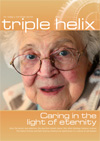Liz Croton looks at the dangers of addition for doctors.
In 1998, a BMA Working Group report estimated that as many as 'one doctor in fifteen may be affected by drug or alcohol problems at some point in their career' (1). The Practitioner Health Programme (PHP) was established in 2008 to provide assessment and treatment for doctors experiencing addiction and mental health problems in the London area. Over a three year period, 142 doctors with an addiction diagnosis were treated. (2) The reason for starting with statistics is to reassure you that, if you are struggling with drugs or alcohol, you are not alone.
If you were to transpose PHP's figures nationally, one wonders how many Christian doctors are afflicted. Yet the subject of addiction can be a taboo in our churches and amongst other professionals. CMF tackled the problem of drug and alcohol addiction amongst doctors back in 1997 with the publication of the booklet Doctors, Drink and Drugs, available on the CMF website. (3)This is a valuable resource for those wanting a biblical exposition of addiction and is essential reading in addition to this article.
This piece was written primarily to provide hope to those Christians concerned that they may have a problem with drugs and/or alcohol and to signpost the way out. You see, we may know factually that the Lord has promised to never leave us (Joshua 1:5b), but it can seem impossible to rekindle this relationship with God with this new idol (our drug of choice standing in the way). Doctors are intelligent individuals and compensate well. Addicted physicians may actually appear to function well on a superficial level until quite late into their illness, which has obvious ramifications for patient safety. There is tremendous professional pride which can impair help-seeking coupled with the denial that goes hand in hand with the addictive process. One thinks 'I can handle this', 'Just one last time', and so the excuses go on.
So how do we know if we have a problem? Narcotics Anonymous have produced a yes/no questionnaire on their website but add in the footnote 'The actual number of yes responses wasn't as important as how we felt inside and how addiction had affected our lives.' (4) A member of Alcoholics Anonymous put it more simply, 'It's when alcohol costs you more than money.' (5)Two themes seem important here with addiction. One is a loss of control over use and the other is the repetition of the behaviour despite the negative consequences.
For a Christian, their relationship with God will be affected hugely. The addict can vacillate between desiring God but wanting the drugs and the booze more, and desperately hoping that God will understand. To make matters more complicated, the behaviours that go along with active addiction, the lies and the secrecy fill the sufferer with so much shame that it can seem as though God has given up on them.
The solution lies in a surrender and admission of powerlessness over alcohol and drugs. Recovery from addiction works best when it involves other recovering people who can provide accountability and support. The PHP website (6) provides a number of useful links to other local mutual support groups for addicted doctors and their families situated outside the London area. A short period of inpatient rehabilitation may be useful for some.
The 12-step groups (Alcoholics Anonymous and Narcotics Anonymous) are countrywide and easily accessible. Their 12-step programmes, originally developed from biblical principles (The Sermon on the Mount and the Book of James) provide a highly effective form of lay 'group psychotherapy'. This helps the individual to see the aspects of their personalities that made them susceptible to addiction and accept the responsibility for changing them. The groups have a spiritual dimension and members are encouraged to depend on a 'Higher Power'. Christians will have no difficulty with this and far from abandoning us, God can use these groups to restore us to relationship with him. Ultimately for Christians, the solution is utter dependence on Jesus Christ and an understanding of His grace which helps us in our weaknesses (2 Corinthians 12:9).
Useful websites
The British Doctors and Dentists Group
A mutual support society for Doctors and Dentists with addiction or dependency problems
































